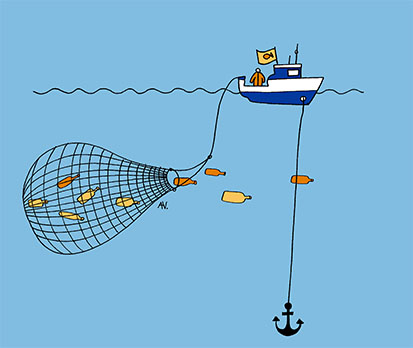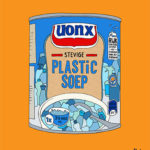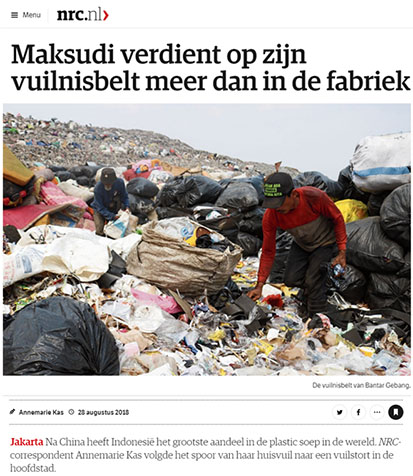The cost of the plastic soup
Plastic pollution has a dramatic effect on the ocean’s ecosystem. That in turn has an effect on everything related to the ecosystem, including the economic activities that depend on sea life.
Fishermen finding that there aren’t ‘other fish in the sea’ due to plastic waste

Did you know… that up to 10% of all the pollution in the ocean comes from fishing.
Human activities such as fishing, shipping, aquaculture, tourism, and recreation are all negatively affected by plastic in the ocean 1. That includes fishermen whose catch is decreasing because there are fewer fish in the sea, or the effect on local tourist industries when tourists avoid beaches known to be strewn with plastic waste.
The costs of pollution
Plastic pollution in the ocean comes at a high cost. Not only in terms of lost income from fishing, aquaculture, and tourism; removing plastic from the ocean and protecting natural areas is also extremely expensive. But who actually pays for those high costs?
Who pays the bill?
It’s difficult to say who will eventually pay the high costs for plastic pollution. Since plastic moves around the ocean, it is difficult to determine how it got there. So it’s impossible to hold someone accountable for the plastic pollution. If it isn’t possible to hold the polluter liable for the pollution, then no one will take responsibility for solving the problem.
A dilemma; would you be willing to pay the costs?

Would you pay the fine?
Let’s use you as an example. Say you throw a plastic wrapper on the street. Someone sees you, and yells: ‘Hey, pick that up!’ You’d have to, because you threw it on the ground and there are witnesses who saw you do it. You could even receive a fine for littering if you don’t pick it up.
But if the plastic wrapper is already lying on the ground, and nobody knows who left it there or who it belonged to, who’s going to pick it up? Do you do it, even if it’s not your rubbish? Should another passer-by pick it up?
Let’s say that the police come by and write out a fine for littering. Who should they give it to? To everyone, because the plastic could belong to anyone, or to no one, because there’s no proof who left it there?
This example illustrates how hard it is to find a solution to the problem of plastic pollution. Since no one person can be found guilty for the pollution, nobody wants to bear the high costs for cleaning it up, with the result that more and more plastic reaches the ocean.
Living on a plastic landfill
In addition to the economic costs of plastic pollution, there are also social costs. Plastic waste means that there are fewer opportunities for recreation in coastal areas. There are also health risks involved. Sharp objects can be left behind or wash ashore on the beach.
In poor regions lacking waste management services, the social costs are largely borne by the poor communities living near the coast.
Coasts can be damaged by plastic washing ashore, or carried downstream by rivers. Most of the plastic waste that ends up in coastal areas doesn’t come from the people who live there.
Many people living in the world’s coastal regions are too poor to move elsewhere, so they are forced to live in a landfill full of plastic. But as you can read in this article in the NRC, there are also people who profit from the plastic waste. They collect plastic from the landfill to earn money.
More interesting info…






